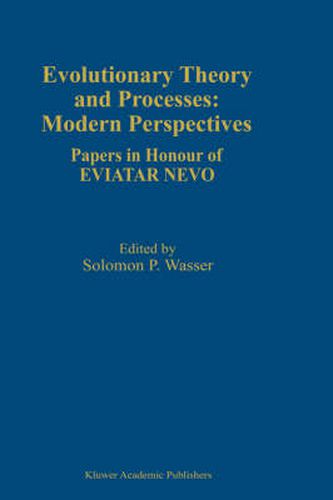Readings Newsletter
Become a Readings Member to make your shopping experience even easier.
Sign in or sign up for free!
You’re not far away from qualifying for FREE standard shipping within Australia
You’ve qualified for FREE standard shipping within Australia
The cart is loading…






This title is printed to order. This book may have been self-published. If so, we cannot guarantee the quality of the content. In the main most books will have gone through the editing process however some may not. We therefore suggest that you be aware of this before ordering this book. If in doubt check either the author or publisher’s details as we are unable to accept any returns unless they are faulty. Please contact us if you have any questions.
This volume consists of papers written by evolutionary, molecular and organismal biologists, geneticists, ecologists, behavioural ecologists, morphologists, mathematicians, theoreticians and experimentalists, in honour of Professor Eviatar Nevo on the occasion of his seventieth birthday. The contributors are only a small subset of his many friends, collaborators and students (not that one can distinguish these categories among his colleagues). His influence, both in Israel and more generally, as a leading evolutionary biologist is indicated by his many co-authors on books and papers, and by his many students integrated in teaching and research. This volume presents some of the most recent results of molecular, genomic, and organismal evolutionary processes. It represents analyses, experiments, observations, reviews, discussions and forecasts of evolutionary theory comprising both novel methods and results, reanalyzed and reviewed data sets based on comparative, experimental, and theoretical studies utilizing model organisms across phylogeny, including bacteria, fungi, plants, animals and humans. It elucidates the revolution in molecular biology that ushered in our understanding of the evolutionary process over time and space. The topics discussed include major problems of evolutionary theory concerning origins, phylogeny, relative importance of evolutionary forces, structure and function, adaptation and speciation in space and time in changing and stressful environments. A major emerging generalization is the nonrandomness of genome structure highlighting the importance of natural selection as a major organizing evolutionary force not only at the phenotypic level, but most importantly at the interlinked genotypic molecular level.
$9.00 standard shipping within Australia
FREE standard shipping within Australia for orders over $100.00
Express & International shipping calculated at checkout
This title is printed to order. This book may have been self-published. If so, we cannot guarantee the quality of the content. In the main most books will have gone through the editing process however some may not. We therefore suggest that you be aware of this before ordering this book. If in doubt check either the author or publisher’s details as we are unable to accept any returns unless they are faulty. Please contact us if you have any questions.
This volume consists of papers written by evolutionary, molecular and organismal biologists, geneticists, ecologists, behavioural ecologists, morphologists, mathematicians, theoreticians and experimentalists, in honour of Professor Eviatar Nevo on the occasion of his seventieth birthday. The contributors are only a small subset of his many friends, collaborators and students (not that one can distinguish these categories among his colleagues). His influence, both in Israel and more generally, as a leading evolutionary biologist is indicated by his many co-authors on books and papers, and by his many students integrated in teaching and research. This volume presents some of the most recent results of molecular, genomic, and organismal evolutionary processes. It represents analyses, experiments, observations, reviews, discussions and forecasts of evolutionary theory comprising both novel methods and results, reanalyzed and reviewed data sets based on comparative, experimental, and theoretical studies utilizing model organisms across phylogeny, including bacteria, fungi, plants, animals and humans. It elucidates the revolution in molecular biology that ushered in our understanding of the evolutionary process over time and space. The topics discussed include major problems of evolutionary theory concerning origins, phylogeny, relative importance of evolutionary forces, structure and function, adaptation and speciation in space and time in changing and stressful environments. A major emerging generalization is the nonrandomness of genome structure highlighting the importance of natural selection as a major organizing evolutionary force not only at the phenotypic level, but most importantly at the interlinked genotypic molecular level.